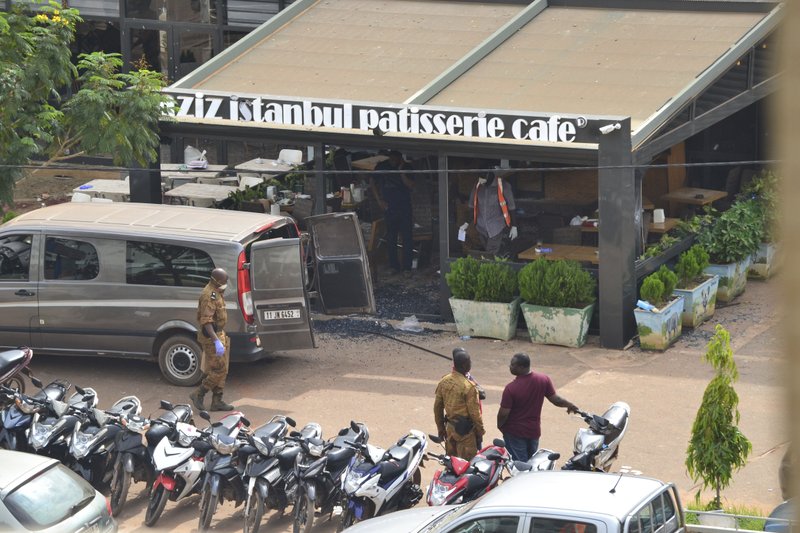
The scene was all too familiar: Islamic extremists striking a popular dining spot while dozens of patrons, many of them foreigners, took a break from daily life in Burkina Faso. Victims were gunned down at random. Gunfire rang out for hours as special forces worked to secure the scene.
After Sunday night’s deadly attack on Kwame N’krumah Avenue, some in this West African nation are wondering: How could this happen again only 200 meters (yards) away from the first massacre in January 2016? And why is the capital no safer?
“There are no words to explain our anger and despair,” said Ousseni Tanagda, whose job selling phone credit has suffered since the 2016 attack on a popular cafe. “I was afraid of staying here because the security measures set up earlier were no more strictly respected as they used to be.”
While Burkina Faso shares a border with volatile Mali, long home to such attacks, the 2016 massacre that killed 30 people shocked many in Ouagadougou. The capital is home to many foreigners working with the United Nations and international aid organizations in this desperately poor country on the edge of the Sahara.
After that attack, security measures were strengthened at sensitive places such as banks, hotels and restaurants, with many hiring armed security personnel. As more time passed without another attack, locals say some of those measures eased.
In recent months, however, the United States and France warned their citizens to avoid certain areas of Burkina Faso, mainly the unstable north near Mali and Niger but also the capital.
Already Sunday’s assault on the Aziz Istanbul restaurant that left 18 people dead has had political fallout, with one former minister saying it underscores “the failure of our security system.”
“Two attacks in about 18 months in the same spot with the same mode of operation, it’s not acceptable,” said Ablasse Ouedraogo, who served as foreign affairs minister during the era of longtime leader Blaise Compaore. “It’s as though we have not learned any lessons.”
Compaore was ousted in a popular uprising in late 2014, and some critics say the military has suffered during the years of political upheaval ever since. During the 2016 assault, Burkina Faso’s security forces waited for hours before trying to intervene despite having people at the scene. During Sunday’s attack, gunfire also rang out for nearly seven hours before officials noted there were only two assailants.
Capt. Guy Ye, spokesman for the special forces, said they are better equipped now than in 2016 but he acknowledged they are still learning.
“There were hostages who had to be freed before launching the assault against the terrorists who were hiding in the back of the restaurant,” he said.
Ouedraogo, the former minister, said the army and security sector need an overhaul. Already they’ve received specialized training from both the French and US militaries.
Felix Alexandre Sanfo, a security expert, said Burkinabes are learning they must accept that the threat of terrorism is here to stay, just as it is in many other parts of the world.
“Many think it’s a problem that can be solved definitively,” Sanfo said. “We are not prepared to maintain an elevated level of vigilance on a permanent basis. People have quickly let down their guard because they think the danger is behind us.”
On the contrary, regional security analysts point to a deepening and troubling Islamic extremism movement in northern Burkina Faso, where an Australian doctor who had spent decades treating civilians has been abducted and remains missing.
The region is now the home of a Burkinabe extremist figure, Malam Dicko, who has collaborated with militants across the border in Mali. Among his objectives has been seeking to end the use of French, the former colonizer’s language, in regional schools. Burkinabe forces backed by French military counterparts have tried to take out Dicko but he remains at large.
Burkina Faso is now one of five regional nations putting together a 5,000-strong force to fight the growing threat from extremists in the vast Sahel region. The first units are expected to deploy in October and all battalions should be on the ground by March. The countries have been pressing the international community to help funding; a gap of 305 million euros ($356 million) remains.
Burkina Faso’s government knows it must move quickly to avoid the political instability and human suffering inflicted by extremists to the north in Mali.
“If we do not master intelligence quickly, we will continue to count the dead due to terrorism because the situation is alarming,” said an intelligence official who spoke on condition of anonymity as they were not authorized to speak to journalists.
“We are vulnerable now, and the situation calls for lucid, cool and objective analysis.”
